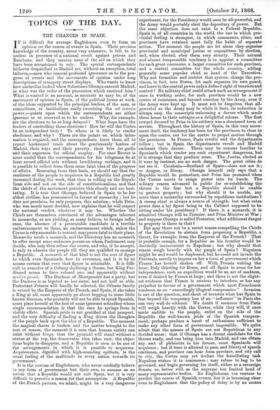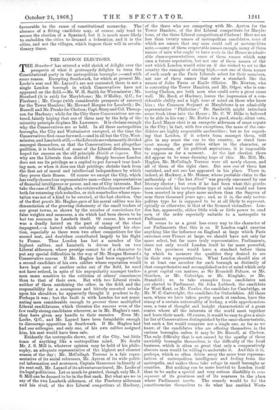TOPICS OF THE DAY.
THE CHANCES IN SPAIN.
IT is difficult for average Englishmen even to form an opinion on the course of events in Spain. Their previous knowledge of the country, never very extensive, is felt to be useless in presence of a national revolt against priests and Bourbons, and they receive none of the aid on which they have been accustomed to rely. The special correspondents hitherto despatched to Madrid are, without an exception, total failures,—men who conceal profound ignorance as to the pro- gress of events and the movements of opinion under long descriptions of trumpery street displays. Who wants to know how umbrellas looked when Salustiano Olozaga entered Madrid, or what was the order of the procession which received him ? What is wanted is an account, as accurate as may be, of the movement of opinion in Spain, of the political forces at work, of the ideas supported by the principal leaders, of the men, or committees, or institutions really exercising the ad interim power,—points upon which the correspondents are either ignorant or so reserved as to be useless. Why, for example, are the elections to be so long delayed ? What hope have the leaders of controlling those elections ? How far will the Cortes be an independent body ? To whom is it likely to render obedience, and why ? These are the points on which infor- mation is required, and the correspondents leave them all to repeat hackneyed trash about the gentlemanly loafers of Madrid, their ways and their poverty, their love for garlic and their eagerness for official employ. For once Reuter is more useful than the correspondents, for his telegrams do at least record official acts without bewildering verbiage, and it is possible to collect from them some faint idea of the progress of affairs. Reasoning from that basis, we should say that the readiness of the people to acquiesce in a Republic had greatly increased during the week, that time is telling on the Repub- lican side and not on the side of constitutionalism, and that the chiefs of the movement perceive this clearly and are hesi- tating. It is true that Olozaga, believed in Spain to be her ablest civilian, has pronounced in favour of monarchy ; but he does not proclaim, he only proposes, this solution ; while Prim, who was much more decided, now explains that he will respect the national verdict, whatever it may be. Whether the Chiefs are themselves convinced of the advantages inherent in monarchy, or are yielding, as many believe, to foreign influ- ence, the absence of a presentable candidate is a terrible embarrassment to them, an embarrassment which, unless the Cortes is veryamenable to control, may prove fatal to their plans. Monarchy needs a monarch, and the Directory has no monarch to offer except some unknown person on whom Parliament may decide, who may then refuse the crown, and who, if he accepts, is only to educate the people till they are qualified to manage a Republic. A monarch of that kind is not the sort of figure to which even Spaniards bow in reverence, and it is by no means certain that even that figure is attainable. It is diffi- cult to conceive of a Coburg declining a throne, but King Fer- dinand seems to have refused one, and apparently without arrare pense'e. The Duchess of Montpensier has a party, but the Duchess is as bigoted as her sister, and not half so able. Protestant Princes will hardly be selected, the Orleans family is vetoed by the Emperor of the French, and Spain, if she takes a King at all, must apparently go about begging to some little known German, who probably will not be able to speak Spanish, must place herself at the feet of some ignorant schoolboy whose single recommendation is that the race he springs from is visibly effete. Spanish pride is not gratified at that prospect, and the very difficulty of finding a King drives the thoughts of the people back upon the idea of a Republic. The moment the magical charm is broken and the matter brought to the test of reason, the moment it is seen that human society can exist without kings, that the pyramid will stand without a statue at the top, the democratic idea takes root, the objec- tions begin to disappear, and a Republic is seen to be one of the arrangements in which it is possible to acquiesce. Acquiescence, dignified with high-sounding epithets, is the usual feeling of the multitude in every nation towards its government.
It is the custom of Englishmen, who never cordially believe in any form of government but their own, to assume as an axiom that a Republic would not suit Spain, but it is very difficult to perceive a reason for that assumption. A Republic of the French pattern, we admit, might be a very dangerous
experiment, for the Presidency would soon be all-powerful, and the Army would probably elect the depositary of power. But the same objection does not exist to a Federal Republic. Spain is, of all countries in the world, the one in which pro- vincial feeling is strongest, in which communes, cities, and provinces have retained most fully the habit of separate action. The moment the people are let alone they organize provincial and municipal juntas or committees by election, and, when elected, obey them very strictly. Their natural and almost irrepressible tendency is to appoint a committee for each great commune, a larger committee for each province; and a central committee for the whole country, adding generally some popular chief as head of the Executive. Why not formulize and restrict that system, change the pro- vinces, in fact, into States, let each organize its own guard, and leave to the central power only a defined right of taxation and control ? No military chief could attack such an arrangement if once in working order, for each province would be a new centre of resistance, and beyond coercion by the Army, even if the Army were kept up. It must not be forgotten that all- powerful as the Army may be while it lasts, its reduction is- always easy, the conscripts welcoming a decree which sends- them home to their cottages as a delightful release. The first reward decreed by Prim to his soldiery was a shortened term of service. Throughout the history of Spain, in this very move- ment itself, the tendency has been for the provinces to close in upon the centre, not for the centre to propel motion through the provinces. In France, Paris revolts and the departments follow ; but in Spain the departments revolt and Madrid endorses their decree. There may be reasons familiar to- Spaniards which render any such experiment dangerous, but it is strange that they produce none. The Juntas, elected as it were by instinct, see no such danger. The great cities do• not see it. Catalonia—Scotland of Spain—does not see it ; or Aragon, or Biscay. Olozsga himself only says that a Republic would be premature, and Prim has promised when the Cortes meets to resign power into its hands. The solitary reason advanced in public for re-establishing the throne is the fear lest a Republic should be unable to protect property ; but why should it be unable, any more than a monarchy surrounded by republican institutions A strong chief is always a source of strength, but what extra power does a lay figure bring to the Cabinet supposed to be sitting under his presidency ? If there is a monarch, it is admitted Olozaga will be Premier, and Prim Minister at War ; and suppose Olozaga is called Protector, what additional danger• to property is there in that ? But may there not be a secret reason compelling the Chiefs of the Revolution to abstain from proposing a Republic, a. threat, for example, from the Emperor of the French? That is probable enough, for a Republic on his frontier would be, decidedly inconvenient to Napoleon ; but why should that reason weigh heavily with the people of Spain ? Napoleon, might be and would be displeased, but he could not invade the Peninsula merely to impose on her a form of government which. France has herself shaken off. With Prussia waiting the hour, Italy thirsting for Rome, and all Spain in arms for her- independence, such an expedition would be an act of madness, even if desired by France at large ; and there is not the slight- est evidence that France is anxious to interfere, or has any prejudice in favour of a government which most Frenchmen condemn as an " exceedingly illogical compromise." Invasion is out of the question, and short of invasion what has Spain to fear beyond the temporary loss of an " influence" in Paris she can very well do without. We doubt if menaces from Paris. will weigh heavily with the Cortes, while they will, if once made audible to the people, enlist on the side of the Republic the well-known pride of the Spanish tempera- ment, perhaps produce a burst of enthusiasm sufficient to make any other form of government impossible. We quite admit that the masses of Spain are not Republican in any decided sense ; that if Olozaga has a decent candidate for the throne ready, and can bring him into Madrid, and can obtain any sort of plebiscite in his favour, most Spaniards will acquiesce ; but if time is allowed to pass, and liberty of speech continues, and province can hear from province, and city call to city, the Cortes may yet decline the humiliating task Napoleon wishes it to commence ; may refuse to beg to be governed, and begin governing for itself, either as a sovereign Senate, or, better still, as the supreme but limited head of many representative bodies. No Englishman can venture to predict the course of Spanish events, but it is becoming clear- even to Englishmen that the policy of delay is by no means
favourable to the cause of constitutional monarchy. The absence of a fitting candidate may, of course, only tend to secure the election of a Spaniard, but it is much more likely to embolden the cities to demand a federation, and it is the .cities, and not the villages, which impose their will in revolu- tionary times.



































 Previous page
Previous page